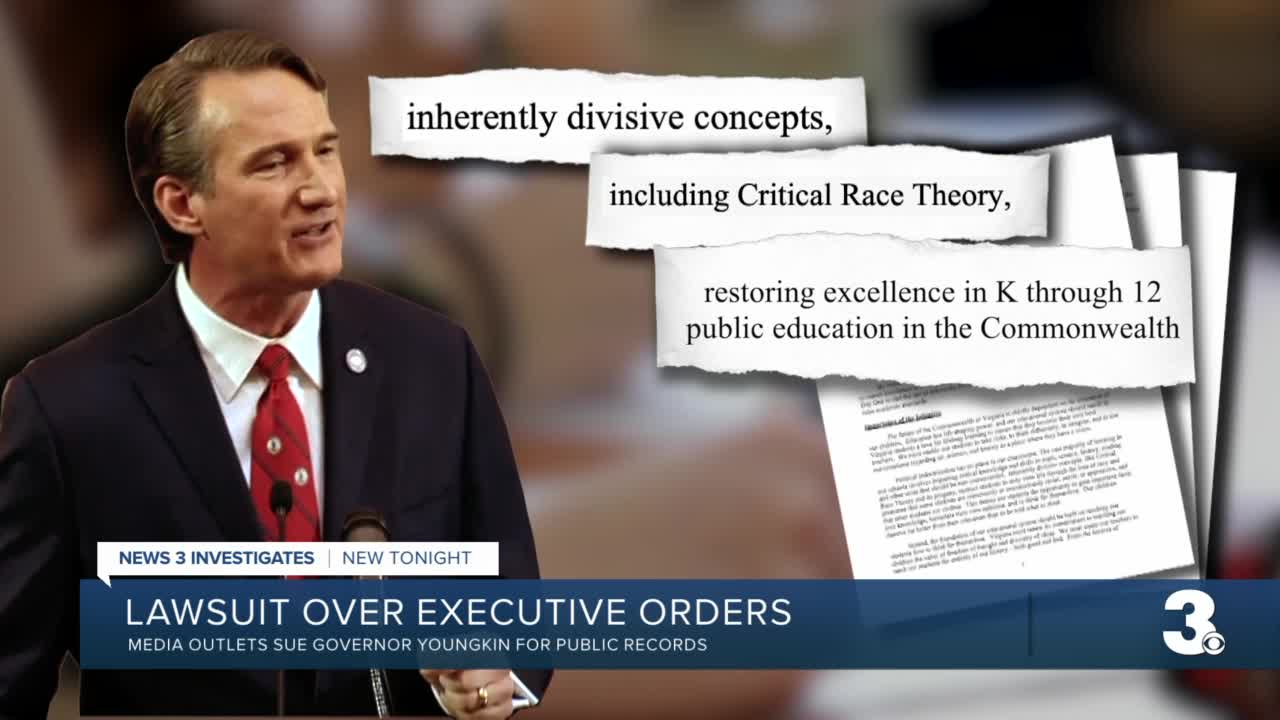NORFOLK, Va. - News 3 strives to fight for you and what you need to know every day.
This includes suing for access of public records.
This is pertaining toexecutive actions signed by Virginia Gov. Glenn Youngkin shortly after taking office earlier this year.
One of those executive orders addresses a hot button issue. Executive Order One banned Critical Race Theory and other “inherently divisive concepts" from being taught in Virginia schools.
“Virginia's parents want our history all of our history the good and the bad to be taught,” Youngkin said earlier this year before state lawmakers. “They want our children to be taught how to think not what to think.”
Weeks later, Youngkin released an interim, 30-day report, which the Superintendent of Public Instruction said, "rescinds certain policies, programs and resources that promote discriminatory and divisive concepts as directed by executive order one."
Educators in Virginia have said Critical Race Theory is not being taught in Virginia schools.
After signing this order, Youngkin created a tip line for parents, teachers, and students to report their concerns.
News 3 and other media outlets sent in public records requests related to emails sent to the tip line and internal memos related to the governor’s executive orders.
After those requests were denied, News 3 joined others in suing Youngkin and the Commonwealth for access to those records.
Wednesday, News 3 got a memo released by the Virginia Department of Education that was sought in one of two lawsuits.
The documents are the confidential working papers of Gov. Youngkin, a high-level set of instructions to various departments within the government listing responsibilities for moving forward on the governor's first-day executive orders.
The 10-page document takes us inside how his Day One executive orders have been instructed to be carried out.
READ: Confidential Working Papers of the Governor
When looking at Executive Order One, under the Department of Education, the instructions mirror what Youngkin stated in the order he signed on Jan. 15.
However, outside of "education," is the instruction related to Executive Order One, which states, “Executive employees shall be prohibited from directing or otherwise compelling students to personally affirm, adopt or adhere to inherently divisive concepts.”
This same line was also found under 11 other departments within Virginia's government.
News 3 talked with Dan Shelley, who is the executive director and chief operating officer of the Radio Television Digital News Association (RTDNA), a group fighting for journalists to get answers for the public.
“You, as a citizen of Virginia need to know not just what the rules are or the regulations are or the executive orders are - you need to know how they were made,” Shelley told News 3. “The working papers give the public insight into the decision-making process that led to the executive order in this case, or to regulations, or to laws.”
“The public needs to know not just what the sausage is, but how it’s made,” Shelley added. “That’s why lawsuits such as this, though unfortunate and disappointing, that they need to be filed; absolutely must be filed.”
So, why is the release of these papers through this lawsuit important for you?
“You can’t be at the state capital; you can’t be at the Department of Education; you can’t be at the governor’s office, but journalists can, and journalists are your representatives,” Shelley said. “It’s critical that journalists serve as your voice so that you get to find out what laws are being made [and] what regulations and executive orders are being made in your name.”
Regarding another lawsuit about communications regarding Youngkin's tip line, News 3 is still waiting for a hearing on that and will keep you posted on how that case moves through the court system.
Wednesday, News 3 reached out to the Governor’s Office for comment on the release of these working papers and are waiting to hear back.




